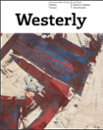AustLit
The material on this page is available to AustLit subscribers. If you are a subscriber or are from a subscribing organisation, please log in to gain full access. To explore options for subscribing to this unique teaching, research, and publishing resource for Australian culture and storytelling, please contact us or find out more.
Latest Issues
AbstractHistoryArchive Description
'This issue of Westerly, while unthemed, is as always the product of a system of order. It is curated, edited, arranged according to a sequence of publication. It follows certain methods, and is set out according to prevailing structures. Each issue exists within the context of what has come before, and what might come in the future. Even within each text, language has its own orders and forms, grammar determines expression. The issue is also testament to the individual—the function of the subjective within a system. With this issue, we are excited to introduce Paul Munden as our new Poetry Editor, taking forward the legacy of Cassandra Atherton’s work over the last four years. We have been very grateful to Cassandra, and we are thrilled that she will continue to contribute to our team, joining Lucy Dougan in the role of Commissions Editor. We are equally happy to be working now with Paul in the selection and curation of Westerly’s poetry offerings. On this occasion, and in this selection, our attention has been drawn to questions of order. Submissions dictate their own ordering of the world: the order of things rising to meet us, occupying our minds and bodies. (Catherine Noske and Josephine Taylor, Editorial introduction)
Notes
-
Only literary material within AustLit's scope individually indexed. Other material in this issue includes:
Greenwich Mean Time by Lynne Viti
Voila by Jenny Irish
Orchard by Angela Sorby
Verge by Peri Dwyer Worrell
Photograph by Steve Denehan
In this version by Dayna Patterson
Incomplete by Ian Seed
Contents
* Contents derived from the 2019 version. Please note that other versions/publications may contain different contents. See the Publication Details.
- Assumptioni"This is the room", single work poetry (p. 10)
- Two Womeni"the washing machine shakes the house", single work poetry (p. 11)
- Fog, single work short story (p. 12-18)
- Here Now, After Being Young but before We Are Oldi"we are folding", single work poetry (p. 19)
- Beneath the Blue Quandongi"Blue as a Brett Whiteley harbour", single work poetry (p. 22)
- The House at the Edge of Town, single work short story (p. 23-29)
- Library Daysi"Some days we go to the library", single work poetry (p. 30-31)
- The Birthday Partyi"The dog is going from guest to guest,", single work poetry (p. 32)
-
To Find a Way Through: The Inaugural Randolph Stow Lecture,
single work
criticism
(p. 33-46)'Let’s begin at school in English class in the ‘new buildings’ around 1978, Geraldton High School, the new wing built to replace the asbestos demountable classrooms to the south of the old school main building. We are reading through Alexander Craig’s anthology Twelve Poets—an in-class reading session to get familiar with some Australian poetry in a more concentrated way than the odd poem here and there in a general poetry anthology. I am lucky enough via my mum, an English teacher at the school, to be already up with a few Australian poets—especially Judith Wright, who is already established and well known to school readers but not actually one of the poets in the anthology. These are newer poets, astonishingly eleven men and only one woman, but Gwen Harwood is no extra spoke on the wheel, she’s pivotal. As Judith Wright looms so large in my imagination, I am shocked into a different way of perceiving ‘landscape’ via the poetry of a once-local Geraldton poet, Randolph Stow, whose poem ‘Landscapes’ echoes off the page:...)
- Pacific Mags Websteri"at this instant only always", single work poetry (p. 47)
- Mythos of Pinei"I can see them in the trees, shifting", single work poetry (p. 48-49)
- Dusk at Limes Chalet— Toodyayi"I watch the turning down of light.", single work poetry (p. 50)
- Port Augusta, single work prose (p. 51-53)
- Light as a Featheri"Before cigarettes, before sex or alcohol,", single work poetry (p. 56)
-
The Semantics of Starvation,
single work
prose
(p. 57-65)'I used to go down to the local pool, biding time between hospital stints. I waded in the shallow end through the heat of summer as my sister did laps in the next lane. I could often only walk a few steps before stopping. My lungs felt strained and my heart had developed random piercing pains. A lifeguard watched closely from nearby. I remember looking at myself in the change room afterwards and being frightened. I had initially caught sight of myself in my peripheral vision and I—unexpectedly—suddenly appeared clearly. I normally saw myself as I had always looked and struggled to perceive the changes wrought by a thirty-kilo weight loss. But when I saw myself, this time, from the corner of my eye, it struck me that I looked like a starved bird. All bones and veins, palpitating. I was a diaphanous skeleton with human gestures, but without a face. An assortment of features had gathered on my skull, but failed to impersonate anything recognisably human. I avoided eye contact because when I found it I saw nothing but a reflection of the spectre I had become.' (Introduction)
- Name = Compatibility Mode, single work poetry (p. 66-67)
- Runei"Blue-grey stone jags up from the foothills,", single work poetry (p. 68)
- Heart, single work short story (p. 69-72)
-
‘Our Legacy Is Truth’: An Interview,
Elfie Shiosaki
(interviewer),
single work
interview
(p. 73-80)'Claire G. Coleman yarned up her new novel The Old Lie with Westerly’s Editor for Indigenous Writing, Elfie Shiosaki.'
- Screening Timei"can’t quite get a fix", single work poetry (p. 81-82)
Publication Details of Only Known VersionEarliest 2 Known Versions of
Last amended 3 Dec 2019 10:13:57
Common subjects:
Export this record





